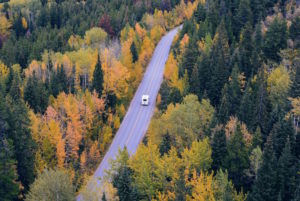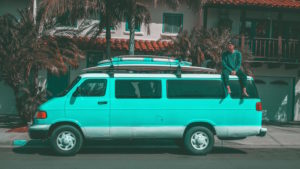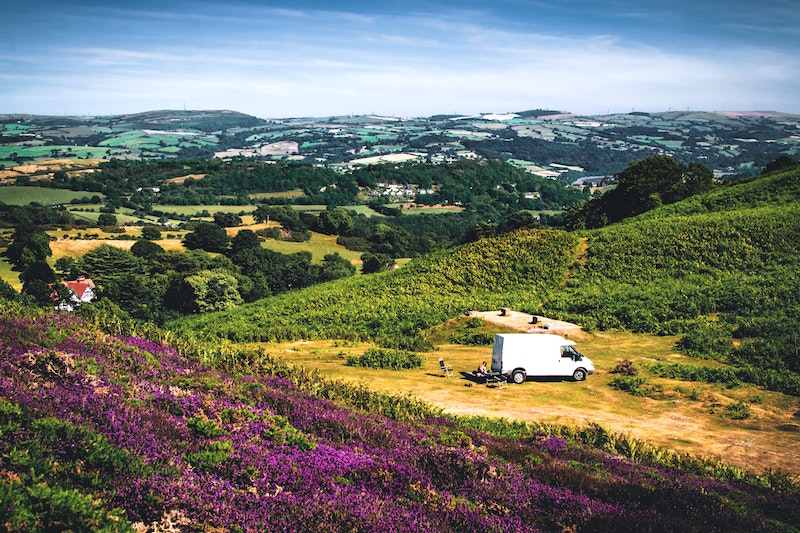There are many reasons why a converted campervan makes sense. You can explore the world with all your home comforts on board. Compared to a caravan or large motorhome, they’re easy to park and drive. They’re also flexible for use everyday to drop the kids at school. The only thing you need to give extra attention to is your insurance because if isn’t right it can cost you money. Covering a converted campervan isn’t always straightforward, therefore mistakes can happen. If you do get it wrong, you could be faced with a big, and expensive, problem. To help you to find the right insurance read our guide to everything you need to know about converted campervan insurance.
1) First, understand the difference between an off-the shelf campervan and a custom campervan to save £thousands
The key thing to remember when it comes to buying your campervan conversion insurance is that you must be 100% accurate. Your insurance can be void if you give false information, even if you’ve done that by mistake. That means you won’t receive anything if you need to make a claim.
Campervans can be generally split into two groups:
- A coach-built campervan or motorhome is supplied from the factory with all the fittings and extras.
- A custom campervan is a standard van that has been customised to provide living accommodation. A custom campervan can refer to a DIY self-build job. It may also apply if a specialist company has carried out the work.
Converting a panel van can work out cheaper than buying a campervan off the shelf. But it could cost a lot more in the long run if you get the wrong insurance and you need to make a claim.
You might call your van a campervan or a motorhome: it really doesn’t matter. The important thing is that the vehicle has been changed from its original purpose.
 2) Secondly, know what changes will make your van a campervan to avoid mistakes
2) Secondly, know what changes will make your van a campervan to avoid mistakes
The good news is that converted campervan insurance can be cheaper for a campervan compared to an ordinary van. It also allows you to legally drive faster in the UK on a single or dual carriageway compared to a panel van. This could save you time as well as cash in speeding fines.
However, the DVLA has strict guidelines that you must follow for a vehicle to be recognised as a conversion. You’ll need to meet all four categories below:
Category 1: Seats and table
The seats and table must have the following features:
- They shall be an integral part of the vehicle living accommodation area, mounted independently of other items.
- A table mounting arrangement shall be secured as a permanent feature, although the table top may be detachable.
- Permanently secured seating must be fixed to the floor or sidewall and available for use at the table.
Category 2: Sleeping accommodation
The sleeping accommodation:
- Shall be an integral part of the vehicle living accommodation area.
- Can be either beds, or beds converted from seats for example.
- Must be secured as a permanent feature, either with the base structure of the vehicle floor or to the side wall, unless the sleeping accommodation is provided over the driver’s cab compartment.
Category 3: Cooking facilities
Your conversion must have a minimum of a single ring cooking facility or microwave, which shall be secured directly to the vehicle floor or side wall as a permanent feature.
If the cooking facility is fuelled by an on-board gas supply:
- The fuel reservoir must be secured in a storage cupboard or the reservoir secured to the vehicle structure.
If the cooking facility is fuelled by gas having a remote fuel supply:
- The fuel supply pipe must be permanently secured to the vehicle structure.
Category 4: Storage facilities
The storage facilities:
- Can be a cupboard for example, or locker.
- Form an integral part of the vehicle living accommodation, mounted independently of other items, unless incorporated below the seat, sleeping accommodation or cooker.
- Must be secured permanently to the vehicle floor or side wall except when the storage facility is over the driver’s cab compartment.
To help to avoid confusion, the wording above is taken directly from www.gov.uk
 As well as these internal features specified above, your vehicle will also have to meet an additional two requirements. We’ve have listed these below.
As well as these internal features specified above, your vehicle will also have to meet an additional two requirements. We’ve have listed these below.
1) First, what is the current body type shown on your V5C registration certificate (log book)?
You can only change the body type to motor caravan if your vehicle is currently listed on your V5C registration certificate (log book) as one of the following:
- ambulance
- box van
- goods
- insulated van
- light goods
- light van
- livestock carrier
- Luton van
- minibus
- MPV (multi-purpose vehicle)
- panel van
- specially fitted van
- special mobile unit
- van with side windows
If your vehicle is not currently one of these, your application will be rejected.
2) Second, consider the required motor caravan external permanent features
Next, your camper van will also need to have the external features which are commonly seen in motor caravans for your application to succeed.
- Two or more windows on at least one side of the main body (this does not include windows on the driver or passenger doors) to provide a reasonable amount of daylight into the living accommodation.
- A separate door which provides access to the living accommodation of the vehicle (this excludes the driver and passenger doors); a window on this door counts as a separate window on the main body.
- Motor caravan-style graphics on both sides of the vehicle.
- An awning bar attached to either side of the vehicle.
- A high-top roof (this does not include a pop-top elevating roof).
3) Buying specialist converted campervan insurance
You need vehicle insurance to legally drive on the road and that means a minimum of third-party cover. This will pay out to the other party if you have an accident and you are to blame. Remember, third party insurance won’t cover the cost of any repairs to your own campervan. And if your campervan is a write-off or is stolen, you’ll have to pay for any replacement yourself. If you want to cover your own bills too, you’ll need fully comprehensive converted van insurance.
Thinking about insurance for your converted campervan doesn’t stop there. Everyone uses their van in different ways and that can mean very different premiums. If you’ll only use it for a holiday for a couple of days each year you don’t want to be paying the same as someone who is embarking on an international road trip for a few months.
- For the best value deal, buy a bespoke policy that is tailored to your needs.
- Basic motor vehicle insurance won’t cover the cost of replacing your van contents if they are damaged or your van is stolen. From your bed and bedding to solar panels and cooking equipment, the cost of contents can quickly mount up. Don’t forget personal possessions, such as tablets and phones, may need to be specified. And if you’re taking expensive sports equipment, such as canoes or boats, on holiday with you, double check if these need to be specified too.
- It’s worth remembering that some home insurance policies may cover your personal possessions or items such as bikes when they are away from the home. Check your home policy schedule carefully for any exclusions or limits on claims or take out a separate policy.
- Speaking to a specialist campervan conversion insurance broker can be the easiest way to get the right level of cover.
4) How to get the best value deal
To get the right level of converted campervan insurance for you, carefully think about how you are going to use your van. It’s worth speaking to a specialist campervan insurance provider to find out your options. Also, consider buying additional extras like breakdown cover at the same time. This often offers better value for money than stand alone cover.
a) First, read the fine print
What seems like a great deal could end up costing you more in the long run. For example, carefully check the fine print to ensure that your converted campervan is covered for habitation. Make sure that items inside the van, such as personal items like tablets and cameras, and equipment such as the fridge and cooker are also covered.
b) Safety
Before you set off on your road trip, bear in mind the payload of your vehicle. Every campervan has a maximum amount of weight it can safely carry and this weight needs to be evenly distributed. Overloading a vehicle can affect braking and stability, and if you do have an accident it could invalidate your claim.
c) How long will you be away?
Many policies may specify you can spend a maximum of 30 days in a row away from home in your van. If you’re planning a longer adventure, all you need to do is make sure this is specified in your policy.
 d) Breakdown cover
d) Breakdown cover
Campervan breakdown insurance gives you peace of mind you can quickly summon help at no extra cost if you have a breakdown. In some cases, you may have breakdown cover through your bank account. Always double-check first in case there is a height or weight restriction that would mean your campervan is not covered. If you do need separate campervan breakdown insurance, check what is offered. For example, are you covered in Europe? Does it include cover if you accidentally fill up with the wrong type of fuel? And will your van be towed back home if it can’t be repaired?
e) Limited mileage discounts
If you only travel rarely in your campervan and stick to the UK, you can get a better deal by opting for a limited mileage policy. Make sure you estimate your mileage accurately as your cover can be voided if you significantly exceed the limits.
f) Imported converted campervan insurance
If you’ve got a left-hand drive vehicle it can easily be covered with a specialist campervan policy.
g) Invest in security
Extra security, such as trackers and cameras can be off-putting for thieves. If your campervan has added security features, make sure you tell your broker as it could earn you a discount.
h) Contact in case of a problem
If something goes wrong on holiday, you’ll be grateful for things like a 24-hour contact line.
-
Tip: if you’re driving overseas, make sure you’ve printed the contact number out just in case. Depending where you are, you might not be able to connect to the internet to access numbers.
 i) Lastly, do you need agreed value cover?
i) Lastly, do you need agreed value cover?
If you’ve spent a lot of money converting your campervan and it’s a one-off, valuation can be trickier. An agreed value policy may be a good option. With this, you’ll get the agreed pay-out if the vehicle is damaged or stolen.
5) Be alert if you use a price comparison website to avoid costly mistakes
We all know that shopping around is the best way to find the cheapest insurance. If you’re looking on price comparison websites, you might be prompted to put in your van registration details. But if you’ve modified your van in any way, you need to be very clear about this when you buy your insurance. That’s because putting in your vehicle registration details will only pull up information about your van as it was supplied from the factory. It could mean you’ll be offered standard van insurance. This could actually cost you more. Worse still, if you do have an accident, you’ll discover that ordinary van insurance does NOT cover your conversion. And that can leave you seriously out of pocket.
- Make sure you specify all modifications when you’re asking for insurance quotes.
- Speak to an independent converted campervan insurance broker. As an insurance expert, a broker will know exactly what questions to ask you to be sure you’re getting robust cover you can rely on.
6) Finally, other legal paperwork to bear in mind if you have a custom campervan
According to the DVLA:
“It is a legal requirement that all UK registered vehicles are classified correctly on the V5C log book. All camper-vans, motor caravans and motorhomes fall into the DVLA category of ‘motor caravan’. If you have converted a van into a motor caravan then you must return the V5C to DVLA for body type amendment.”
- If you’ve bought a converted campervan, check the V5C to ensure it is correct.
- Did you DIY? If you’ve carried out the conversion, make sure you meet the government guidelines for converting a van.
- Send the completed section 7 of your V5C form with photographic evidence of:
- The finished vehicle showing the required features in place.
- Front and rear shots showing the registration plates.
- If there is a rear door, open it to show the interior.
- Interior photographs clearly showing each required feature.
- Photographs of the bed and table in usable positions.
- Include a description of what is being shown in the photograph on the back of each image, along with the date and vehicle registration number.

Sorting the paperwork for peace of mind and happy holidays
The open road stretching out in front of you. Stopping wherever and whenever you want. Discovering spectacular views and hidden beaches. Whether you’ve got your sights set on a couple of months in Southern Europe or a weekend exploring the country lanes of Cornwall or the Lakes, load up your campervan and arm yourself with a list of the best campsites for campervans and you’re ready for a trip to remember. Sounds idyllic, doesn’t it? And it is, as long as you don’t forget the essential paperwork beforehand. If you do, your dream road trip could turn into a nightmare.
The easy way to buy campervan conversion insurance
Whether you drive a classic 1960s V-Dub or a brand new transit conversion, we understand that there’s no such thing as one size fits all when it comes to converted van insurance. Whether you want comprehensive campervan conversion insurance cover to include everything from awnings to camping equipment for the whole year or are just looking for third party cover for a couple of days, we can find you the right insurance. And because we can take into account things like low mileage options and secure storage, we will also help you to find it at the right price.
Our specialist converted campervan insurance team at Park Insurance has 30 years of experience finding the best value deals without compromising on cover. That means you can set off on your road trip with real peace of mind. We will scour the market for insurance tailor-made to meet your specific needs so you don’t pay for anything you don’t need. And we will use our significant buying power to negotiate big discounts on your behalf. Call us now on 0117 955 6835 or get a free, no-hassle quote.
This article was originally published in June 2016. It has since been completely updated to provide you with the best and most accurate information.

